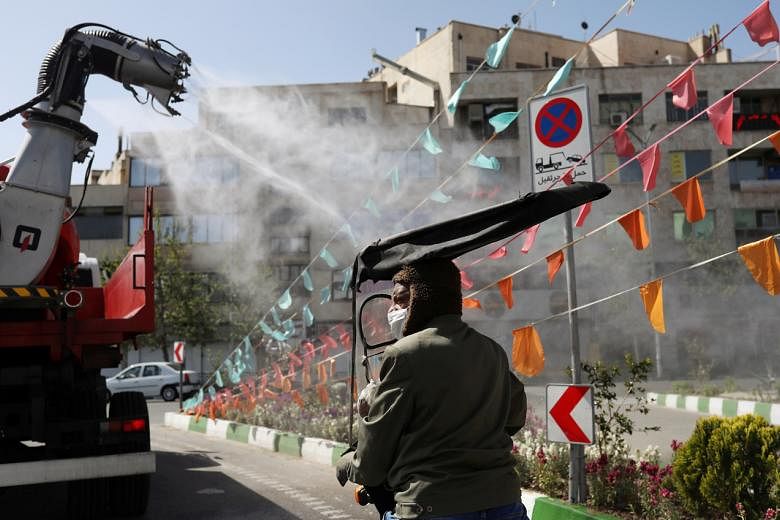NEW YORK (NYTIMES) - The images are compelling: Firetrucks in Teheran or Manila spray the streets. Amazon tests a disinfectant fog inside a warehouse, hoping to calm workers' fears and get them back on the job. TV commercials show healthcare workers cleaning chairs where blood donors sat. Families nervously wipe their mail and newly delivered groceries.
These efforts may help people feel like they and their government are combating the coronavirus. But in these still-early days of learning how to tamp down the spread of the virus - whether it's on steel poles in trains, the streets or the cardboard boxes delivered to homes - experts disagree on how best to banish the infectious germs.
"There is no scientific basis at all for all the spraying and big public works programmes," said Professor Michael Osterholm, director of the Centre for Infectious Disease Research and Policy at the University of Minnesota. "It's at best wasteful and at worst we're just putting disinfectants into the environment that we don't need."
Most transmission of the virus comes from breathing in droplets that an infected person has just breathed out - not from touching surfaces where it may be lurking.
"Transmission of novel coronavirus to persons from surfaces contaminated with the virus has not been documented," the Centres for Disease Control and Prevention (CDC) notes on its website.
Hand washing remains important - now and always, Prof Osterholm said. But to avoid getting sick, the public should focus on staying away from other people, he added.
Other experts are not ready to confidently dismiss disinfecting. There are just too many unknowns about this virus, said Professor Marc Lipsitch, an infectious disease epidemiologist at the Harvard T.H. Chan School of Public Health.
"I'd personally be surprised if disinfecting outdoor spaces has any impact, but that's more of a hunch based on first principles than a scientifically informed view," Prof Lipsitch said, because no one has studied the issue yet.
And it will be difficult to study the effectiveness of such moves, he said on a Tuesday (April 14) call with journalists because "everyone is throwing a mix of interventions at the problem, as they should".
To conduct scientific research, measures would have to be tried one at a time to gauge their effect.

Joshua Santarpia, an associate professor of pathology and microbiology at the University of Nebraska Medical Centre, questions the widespread use of disinfectants outdoors. "It seems like a little much," he said of the trucks spraying in other countries. "It seems unnecessary to do that outside."
Claims made on Facebook that helicopters would be spraying disinfectant in New York City were false, The Associated Press reported.
Assoc Prof Santarpia said that disinfecting surfaces indoors, though - in airports, for example - is a good idea. "You want to make sure an indoor space is decontaminated before you allow people back in," he said.
Airlines, including Delta, have been fogging aircraft with disinfectants. And transit authorities, including those in New York, Boston and Washington, DC, have stepped up their cleaning practices. The Georgia National Guard has been disinfecting the state's nursing homes.
The virus probably can't survive more than a few days on most surfaces, according to one recent study, and it's not clear whether the concentration of the virus on a surface would be enough to transmit disease.
So theoretically, leaving a space alone for a week should be enough to decontaminate it. But Assoc Prof Santarpia said most people understandably want the extra assurance that cleaning might provide.
"You want to be able to say, 'I cleaned it. I know it's safe,'" he said.
The CDC has issued guidelines on which products are effective at safely getting rid of the coronavirus, and the Environmental Protection Agency (EPA) has released a list of registered cleaning products that meet its criteria for killing it.
Household cleaners are designed to disinfect surfaces, not to eliminate virus from the air, said Ms Sandy Posa, chief executive of Force of Nature, a startup making an environmentally friendly disinfectant that meets the EPA's standard.
Prof Osterholm of the University of Minnesota said he's spent his 40-year medical career trying to persuade people to be more diligent about washing their hands to prevent disease - so he doesn't want to say it's not important. But he believes that social distancing will prevent the majority of Covid-19 infections.











